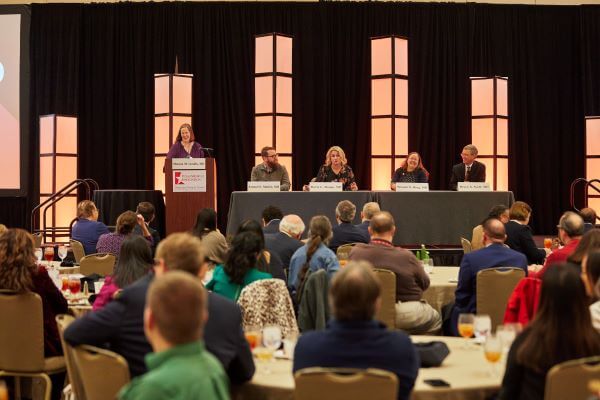
For many Texas physicians, mentorship is a two-way street, with both parties – mentor and mentee – learning from each other, regardless of their ages or the lengths of their curriculum vitae.
This was one take-home message from the “Generational Differences Among Leaders” panel discussion at the Texas Medical Association’s Leadership Summit in Austin Jan. 26-27. Hosted by the TMA Women Physicians Section and moderated by section chair Shanna Combs, MD, the candid discussion featured physicians at different stages of their careers and prompted a lively question-and-answer session among attendees.
Each panelist agreed that mentorship comes in many forms, including from peers, younger colleagues, mentees, and students.
For example, Maria Monge, MD – a pediatric adolescent medicine physician in Austin, member of TMA’s Council on Science and Public Health, and associate professor of pediatrics at The University of Texas at Austin Dell Medical School – says her students are teaching her to be “radically inclusive.” Their lesson has ripple effects, transforming how she approaches her work, both in academia and in patient care, after 11 years in practice.
“We have to learn from them how to entertain all the diversity of thought, the diversity of human existence – all those good things,” she said.
During his three decades in practice, panelist Bruce Scott, MD, an otolaryngologist from Kentucky and president-elect of the American Medical Association (AMA), has leaned on close friends to provide honest feedback. He, too, learns from his medical student and resident mentees, most of whom are digital natives.
“The whole embrace of social media and digital [communication] ... seems to be intuitive to the younger generation, and I’ve got to figure it out,” he said.
Such generational differences can create room for growth, added obstetrician-gynecologist Brandi Ring, MD, a member of TMA’s Council on Medical Education and associate medical director for the Center for Children and Women in Houston. For example, her residents often prefer texting over other forms of communications and may dress more casually than previous cohorts.
Dr. Ring says it’s incumbent on her and others in her position to establish professional standards through “difficult” conversations. But she also is quick to identify generational continuities, including in her residents’ passion for and dedication to medicine.
Finally, the panelists encouraged the packed audience to seek out meaningful leadership development and mentorship opportunities.
For instance, Samuel Mathis, MD, an assistant professor of family medicine at The University of Texas Medical Branch School of Medicine at Galveston, said his training with TMA’s Leadership College prepared him to represent TMA’s Young Physician Section on the association board and in the Texas Delegation to the AMA.
These roles require vulnerability and commitment, especially for early career physicians like him who also are balancing family responsibilities. But he said the effort is worthwhile.
“The act of actually being here and showing up is what is important,” he said.
Dr. Scott, whose first leadership role was as chair of TMA’s then Resident Physician Section (now the Resident and Fellow Section), urged medical students, residents, and young physicians to get involved in organized medicine and in their communities, where their patients likely already view them as leaders because of their medical expertise.
“If you’re in this room, you’re a leader,” he said.
For more information about TMA meetings and events, including the upcoming TexMed conference in May, check out TMA’s Events webpage.